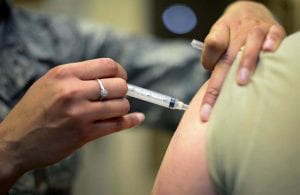Will COVID-19 virus mean new common-sense airline medical rules?

For the past decade, Travelers United has warned about the need for common-sense rules to keep the illest passengers from traveling on planes. However, large numbers of passengers are intent on scamming the system by claiming illnesses. Even sick passengers with legitimate doctor’s letters are forced to fly unless they are willing to pay exorbitant change fees.
Unfortunately, the airline profit motive is far stronger than any public outcry about being forced to travel while sick. So, airlines are refusing to change their ways. However, the coronavirus may be the medical straw that will break this airline rule. When airplanes are the perfect system to spread a virus, rules controlling diseases may come into focus. Some medical experts feel that should a vaccine be developed for COVID-19, public pressure or government rules may mean airlines need to take more responsibility.
Should unvaccinated people be allowed to fly?
Should vaccinations for COVID-19 become available and the airlines be forced to only fly those with vaccinations, it could mean a total change for the airline world. Plus, vaccinations for the flu and for measles could also be required. Then, travelers with contagious diseases can be refused travel or would be allowed to delay travel.
TheConveration.com has reported on the latest CDC actions. The connection between airline flights and the spread of contagious diseases is easy to see. Getting the airlines to change their policies of dealing with sick passengers is another story.
Air travel is a way to spread many virulent infectious diseases, including diphtheria, hepatitis A, influenza A and B, measles, mumps, meningococcus, rubella, tuberculosis, norovirus – the list goes on. In the U.S., airlines move more than 2.5 million people per day, squeezing them into long metal cylinders where all share the same air, the same restrooms, and take meals shoulder-to-shoulder for hours and hours.
Measles outbreaks have begun at airports. One plane carrying a single symptomatic SARS patient saw the disease develop in at least 16 others. Transmission of seasonal influenza during flights is well documented; after 9-11, when U.S. airline travel stopped abruptly, the pattern of mortality associated with it or pneumonia dramatically shifted. Consistently, the research finds the single most significant predictor of influenza spread is domestic airline volume.
The new COVID-19 Czar will lead America’s efforts at containing the virus
As of the time of writing, there have been only 57 cases of coronavirus reported in the USA. The cruise ship, Diamond Princess, created 40 of the US cases. However, the virus has now erupted in more than 24 countries. Many experts feel that it is only a function of time before the virus spreads in the US.
Alex M. Azar II, the secretary of health and human services, has been heading the antivirus efforts. He is now being replaced as the coronavirus czar by Vice President Mike Pence. Experts, legal and public health scholars, study how airline travel contributes to the spread of infectious agents, and how potential vaccines could limit it.
There is no doubt that close contact, especially when prolonged, spreads contagion. This is true for respiratory droplets, direct skin contact, and sometimes, fecal or oral spread. Making matters much worse, airlines are taking people from place to place and turning what might otherwise be local outbreaks into worldwide crises.
It’s hard to conceive a more efficient way to spread infectious disease.
The World Health Organization rules: Travelers with medical conditions
Airlines can make medical decisions about which passengers to allow onboard flights. It would be easy for airlines to stop nonvaccinated passengers from flying. The biggest issue will be how to verify whether or not a passenger has received the vaccine.
Airlines have the right to refuse to carry passengers with conditions that may worsen. If the crew believes a passenger may have serious consequences during the flight, the passenger can be stopped. They may require medical clearance from their medical department/adviser if there is an indication that a passenger could be suffering from any disease or physical or mental condition that:
- may be considered a potential hazard to the safety of the aircraft;
- adversely affects the welfare and comfort of the other passengers and/or crew members;
- requires medical attention and/or special equipment during the flight;
- may be aggravated by the flight.
If the cabin crew suspects before departure that a passenger may be ill, the aircraft’s captain will be informed and a decision made as to whether the passenger is fit to travel, needs medical attention, or presents a danger to other passengers and crew or to the safety of the aircraft.
Will COVID-19 be the start of a change in the way that airlines deal with sick passengers? Time will tell. However, while so far the flu has killed thousands more than COVID-19, the new virus seems to be getting the major headlines. Plus, politicians will follow the hot story. There may be a change in airlines’ medical decisionmaking.
Feature photo courtesy Wikimedia Commons
You may also enjoy these Travelers United Blog posts:
How to avoid passing out at 35,000 feet
Scores of passengers suffer illness on airlines

Charlie Leocha is the President of Travelers United. He has been working in Washington, DC, for the past 14 years with Congress, the Department of Transportation, and industry stakeholders on travel issues. He was the first consumer representative to the Advisory Committee for Aviation Consumer Protections appointed by the Secretary of Transportation from 2012 through 2018.



